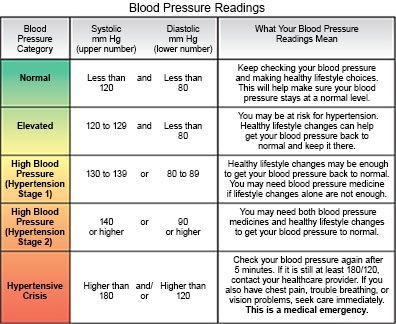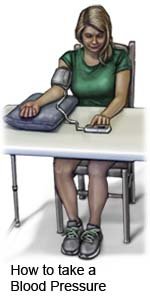Hypertensive Crisis
Medically reviewed by Drugs.com. Last updated on Aug 4, 2025.
A hypertensive crisis is a sudden spike in blood pressure to 180/120 or higher. A normal blood pressure is 119/79 or lower. A hypertensive crisis is also known as acute hypertension. This is a medical emergency that could lead to organ damage or be life-threatening.
 |
DISCHARGE INSTRUCTIONS:
Call 911 for any of the following:
- You have chest
- You have back pain or shortness of breath.
- You have weakness or numbness in your face, arms, or legs.
- You cannot see or talk as well as usual.
Return to the emergency department if:
- You have a severe headache.
Related medications
Treatment options
The following list of medications are related to or used in the treatment of this condition.
Contact your healthcare provider if:
- Your blood pressure is 180/110 or higher but you have no other symptoms.
- You have questions or concerns about your condition or care.
Medicines:
You may need any of the following:
- Blood pressure medicine is given to lower your blood pressure. There are many different types of blood pressure medicine, and you may need more than one type. It is very important to take your blood pressure medicine exactly as directed. Skipped doses can lead to a hypertensive crisis. Talk to your healthcare provider if you are having side effects from your medicine. Do not stop taking it without talking to your healthcare provider.
- Diuretics help decrease extra fluid that collects in your blood vessels. This lowers your blood pressure by reducing pressure in your arteries. Diuretics are often called water pills. You may urinate more often while you take this medicine.
- Take your medicine as directed. Contact your healthcare provider if you think your medicine is not helping or if you have side effects. Tell your provider if you are allergic to any medicine. Keep a list of the medicines, vitamins, and herbs you take. Include the amounts, and when and why you take them. Bring the list or the pill bottles to follow-up visits. Carry your medicine list with you in case of an emergency.
Follow up with your healthcare provider within 1 to 5 days or as directed:
You will need to return to have your blood pressure checked and other tests. Your healthcare provider may also refer to you a cardiologist. Write down your questions so you remember to ask them during your visits.
Prevent another hypertensive crisis:
- Check your blood pressure at home. Sit and rest for 5 minutes before you take your blood pressure. Extend your arm and support it on a flat surface. Your arm should be at the same level as your heart. Follow the directions that came with your blood pressure monitor. If possible, take at least 2 blood pressure readings each time. Take your blood pressure at least twice a day at the same times each day, such as morning and evening. Keep a record of your readings and bring it to your follow-up visits. Ask your healthcare provider what your blood pressure should be.

- Manage any other health conditions you have. Health conditions such as diabetes can increase your risk for hypertension. Follow your healthcare provider's instructions and take all your medicines as directed.
- Ask about all medicines. Certain medicines can increase your blood pressure. Examples include oral birth control pills, decongestants, herbal supplements, and NSAIDs, such as ibuprofen. Your healthcare provider can tell you which medicines are safe for you to take. This includes prescription and over-the-counter medicines.
- Limit sodium (salt) as directed. Too much sodium can affect your fluid balance. Check labels to find low-sodium or no-salt-added foods. Some low-sodium foods use potassium salts for flavor. Too much potassium can also cause health problems. Your healthcare provider will tell you how much sodium and potassium are safe for you to have in a day. He or she may recommend that you limit sodium to 2,300 mg a day.

- Follow the meal plan recommended by your healthcare provider. A dietitian or your provider can give you more information on low-sodium plans or the DASH (Dietary Approaches to Stop Hypertension) eating plan. The DASH plan is low in sodium, unhealthy fats, and total fat. It is high in potassium, calcium, and fiber.

- Exercise to maintain a healthy weight. Exercise at least 30 minutes per day, on most days of the week. This will help decrease your blood pressure. Ask your healthcare provider about the best exercise plan for you.

- Decrease stress. This may help lower your blood pressure. Learn ways to relax, such as deep breathing or listening to music.
- Limit alcohol as directed. Alcohol can increase your blood pressure. A drink of alcohol is 12 ounces of beer, 5 ounces of wine, or 1½ ounces of liquor.
- Do not smoke. Nicotine and other chemicals in cigarettes and cigars can increase your blood pressure and also cause lung damage. Ask your healthcare provider for information if you currently smoke and need help to quit. E-cigarettes or smokeless tobacco still contain nicotine. Talk to your healthcare provider before you use these products.
© Copyright Merative 2025 Information is for End User's use only and may not be sold, redistributed or otherwise used for commercial purposes.
The above information is an educational aid only. It is not intended as medical advice for individual conditions or treatments. Talk to your doctor, nurse or pharmacist before following any medical regimen to see if it is safe and effective for you.
Learn more about Hypertensive Crisis
- Do blood pressure drugs interact with alcohol?
- FDA-Approved Weight Loss Drugs: Can They Help You?
- Which Drugs Cause Weight Gain?
Treatment options
- Medications for High Blood Pressure
- Medications for Hypertensive Congestive Heart Failure
- Medications for Hypertensive Encephalopathy
- Medications for Hypertensive Heart Disease
- Medications for Hypertensive Heart with CHF and Renal Disease
- Medications for Hypertensive Heart without CHF and Renal Disease
- Medications for Renovascular Hypertension
Care guides
Symptoms and treatments
Medicine.com guides (external)
Further information
Always consult your healthcare provider to ensure the information displayed on this page applies to your personal circumstances.
